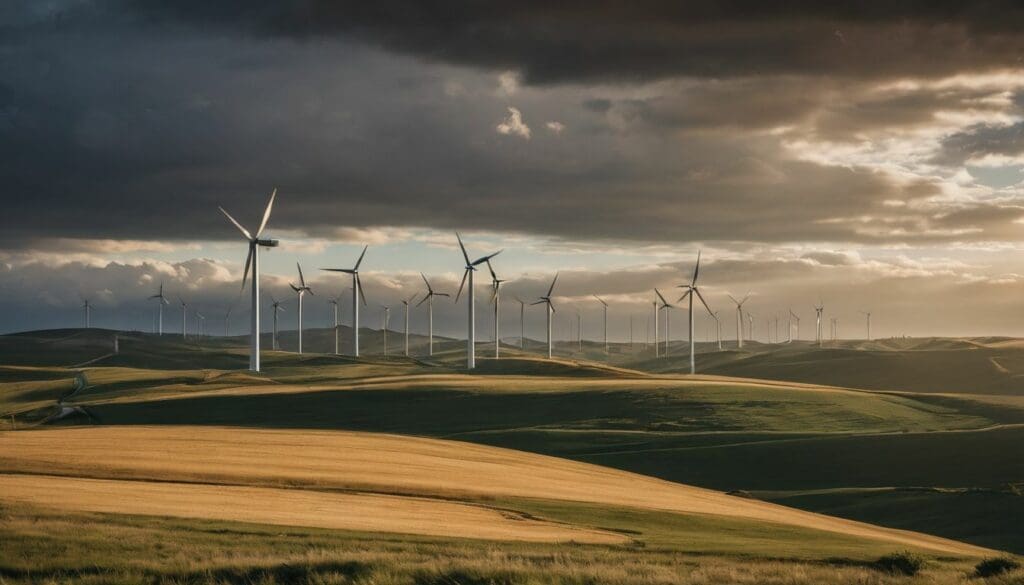 Rising energy bills are a worry for many of us. Renewable energy could cut costs and help our planet too. This blog will guide you on how renewable sources can lead to energy freedom.
Rising energy bills are a worry for many of us. Renewable energy could cut costs and help our planet too. This blog will guide you on how renewable sources can lead to energy freedom.
Let’s explore this green revolution together!
Key Takeaways
- Renewable energy, like wind and solar power, can help countries stop relying on foreign fuel sources. This makes for a more secure nation that controls its own energy.
- Investing in renewable resources creates jobs and boosts local communities’ economies. It also means cleaner air to breathe and less damage to the environment.
- To gain energy independence with renewables, we need to use energy smarter across homes, businesses, and transport. This will save money and be better for the planet.
- A strong power grid using different types of clean energy is key. It keeps the lights on everywhere—even in far-off places—and stops us from being too dependent on one source of power.
- Taking action towards renewable energies such as building wind farms and installing solar panels gives us long-lasting benefits: stable prices for our electricity, new job chances, and care for our world’s future.
What is Energy Independence and Why is it Important?
Energy independence means a country can meet its energy needs without relying on imports from other nations. Achieving this stands at the heart of national security, economic prosperity, and environmental health.
Countries that depend heavily on imported oil or gas can face unpredictable supply disruptions due to geopolitical tensions, conflicts, or natural disasters. Such reliance also leaves them vulnerable to price volatility which can wreak havoc on economies and budgets.
Embracing renewable energy sources is essential for reducing this dependence. Wind power and solar power offer abundant and locally sourced alternatives to fossil fuels. Shifting towards these sustainable options bolsters a nation’s control over its energy resources, underpins long-term stability in energy costs, and mitigates the impact of climate change by lowering greenhouse gas emissions.
This strategic shift promotes not just self-sufficiency but also strengthens resilience against climatedriven energy disruption.
Harnessing clean energy from public lands and waters enhances our ability to achieve national energy independence while protecting our planet for future generations. Transitioning from traditional fossil fuels paves the way toward a more secure and sustainable future where we are less at the mercy of global market fluctuations or external pressures.
Moving forward requires an impactful transition with collective efforts focusing on expanding renewable infrastructure; thus paving the path towards “Transitioning from Fossil Fuils to Renewables”.
Transitioning from Fossil Fuels to Renewables
The public increasingly supports wind and solar power as alternatives to fossil fuels, but there is still opposition to phasing out gasoline vehicles.
Public expectations
Public expectations for transitioning to renewable energy sources are high. Many environmentally conscious individuals and communities now expect significant progress in phasing out fossil fuels and promoting wind and solar power.
There is also growing support for policies that encourage the adoption of electric vehicles, while some segments of the public remain wary about completely replacing petrol-powered cars.
Nevertheless, there is a general optimism among people who prioritise conservation and environmental sustainability when it comes to embracing renewable energy as a primary source of power.
Support for wind and solar power
Support for wind and solar power is growing as more people recognise the environmental benefits of renewable energy sources. With advancements in technology, wind and solar power have become more efficient and affordable, making them viable alternatives to fossil fuels.
Communities are increasingly embracing these clean energy options, contributing to reduced carbon emissions and healthier environments. Businesses are also recognising the economic advantages of investing in wind and solar power, driving a shift towards sustainable practices.
Advocates for wind and solar power highlight their role in reducing dependence on foreign energy sources while promoting local job growth and economic stability. The appeal of renewables lies not only in their environmental impact but also in their potential to create a more secure and resilient energy infrastructure for future generations.
Opposition to phasing out gasoline vehicles
Some people resist the idea of phasing out gasoline vehicles, fearing increased costs and inconvenience. They may also be concerned about the availability and reliability of electric vehicle infrastructure, especially in rural areas.
Plus, there is a sentiment that eliminating gasoline cars threatens personal freedom and convenience. However, as technology advances and governments invest in charging infrastructure, these concerns can diminish.
Additionally, highlighting the environmental benefits of transitioning to electric vehicles can help alleviate opposition.
Opponents argue that existing gasoline-fueled vehicles are deeply embedded in society’s infrastructure and culture; therefore abandoning them would require significant changes on individual and societal levels.
Benefits of Renewable Energy for Achieving Energy Independence
Renewable energy reduces reliance on foreign sources, stabilises prices and supply, and supports local economies and job growth. Discover how renewables can lead to energy independence by reading on.
Decreased reliance on foreign sources
Renewable energy decreases reliance on foreign sources of fuel, promoting energy independence. This reduces vulnerability to international supply disruptions or price fluctuations in the global market.
Supporting local economies and job growth, it ensures a stable and consistent supply of energy for a more secure future.
To achieve true energy independence through renewables, transitioning from fossil fuels is crucial. It requires commitment to investing in renewable energy sources and enhancing overall energy efficiency across various sectors, driving the shift towards sustainability while providing long-term benefits for our planet.
Stable prices and supply
Renewable energy contributes to stable prices and supply, reducing the impact of fluctuations in global oil markets. This reliability supports domestic economies and provides assurance for consumers while promoting sustainable practices.
Transitioning to renewable sources decreases reliance on foreign fossil fuels, which helps achieve price stability and ensures a consistent energy supply for future generations.
Embracing renewables not only secures stable prices but also fosters an environment that encourages innovation, job creation, and local economic growth. By supporting renewable energy initiatives, we can lay the foundation for a self-sufficient and resilient energy landscape that benefits both current and future generations.
Supporting conservation efforts leads to healthier ecosystems, cleaner air quality, and reduced dependence on non-renewable resources.
Supporting local economies and job growth
Renewable energy initiatives create job opportunities and stimulate economic growth within local communities. Wind and solar projects, in particular, provide employment through construction, maintenance, and manufacturing of components.
Additionally, investing in renewable power sources generates revenue for businesses and workers while reducing reliance on foreign energy imports.
Transitioning to renewables helps support local economies by boosting job creation and providing sustainable income opportunities. By promoting local economic development, renewable energy forms a crucial part of achieving long-term energy independence.
Steps to Achieve Energy Independence Through Renewables
Investing in renewable energy sources is crucial for achieving energy independence, as well as improving energy efficiency and building a diverse and secure power grid. Supporting remote locations and local economies is also key to the transition towards renewable energy.
Investing in renewable energy sources
To achieve energy independence, it is essential to invest in renewable energy sources. This involves expanding wind and solar power generation as well as exploring other viable alternatives such as hydroelectric and geothermal energy.
By doing so, we can reduce our dependence on foreign oil reserves and decrease carbon emissions that contribute to climate change.
Renewable energy investments also bolster local economies by creating job opportunities in construction, manufacturing, and maintenance within the clean energy sector. Furthermore, supporting these initiatives enhances the security of our energy supply while promoting sustainability for future generations.
Improving energy efficiency
Transitioning from investing in renewable energy sources to improving energy efficiency is crucial for achieving energy independence. Improving energy efficiency reduces overall energy consumption, leading to cost savings and a lighter environmental footprint.
Enhancing the efficiency of appliances, vehicles, and buildings through better insulation, modern technologies, and smarter design plays a significant role in reducing our dependence on traditional fuel sources while promoting sustainability.
By increasing the efficiency of how we use energy across all sectors, we can make substantial strides towards achieving greater energy independence through renewables. Focusing on small changes that lead to more efficient operations ensures a sustainable future for generations to come.
Building a diverse and secure power grid
Improving energy efficiency is a crucial step towards achieving energy independence through renewables. Building a diverse and secure power grid is equally important. By integrating various renewable energy sources such as wind, solar, hydro, and geothermal into the grid, we can ensure a stable and reliable energy supply.
Additionally, incorporating advanced technology for monitoring and managing the grid enhances its resilience against potential disruptions.
A diverse power grid not only promotes sustainability but also reduces the dependency on single energy sources, contributing to enhanced energy security. It allows for effective utilisation of different renewable resources based on geographical advantages and availability.
Supporting remote locations and local economies
Building a diverse and secure power grid is essential for ensuring that all areas, including remote locations, have access to reliable energy. This infrastructure investment can provide economic opportunities in these regions and contribute to local job growth.
Renewable energy projects in remote areas offer the potential for sustainable development while reducing dependence on imported fossil fuels.
By supporting local economies through renewable energy initiatives, communities can benefit from increased economic activity and job creation. Developing renewable energy sources such as solar and wind power in remote locations not only boosts the economy but also contributes to environmental sustainability by reducing carbon emissions and promoting cleaner air quality.
Conclusion
In conclusion, achieving energy independence through renewables is essential for a sustainable future. Investing in wind and solar power, improving energy efficiency, and diversifying our power grid are crucial steps forward.
By transitioning from fossil fuels to renewable energy sources, we can decrease reliance on foreign oil, stabilise energy prices, and support local economies while creating new job opportunities.
It’s time to embrace the potential of renewables for a cleaner and more secure energy future.
FAQs
1. What does energy independence through renewables mean?
Energy independence through renewables means a country can meet its energy needs using renewable sources, such as solar or wind power, instead of relying on fossil fuels.
2. Why should we consider switching to alternative energy?
Switching to alternative energy helps reduce dependence on other countries for fuel and promotes price stability while being more sustainable for the environment.
3. Can renewable energy provide enough power for our needs?
Yes, with advancements in technology, renewable energies like solar and wind are increasingly capable of meeting our electricity demands.
4. How do renewables impact the economy?
By investing in alternatives to fossil fuels, an economy can create jobs while working towards energy independence and sustainability, leading to long-term economic benefits.





